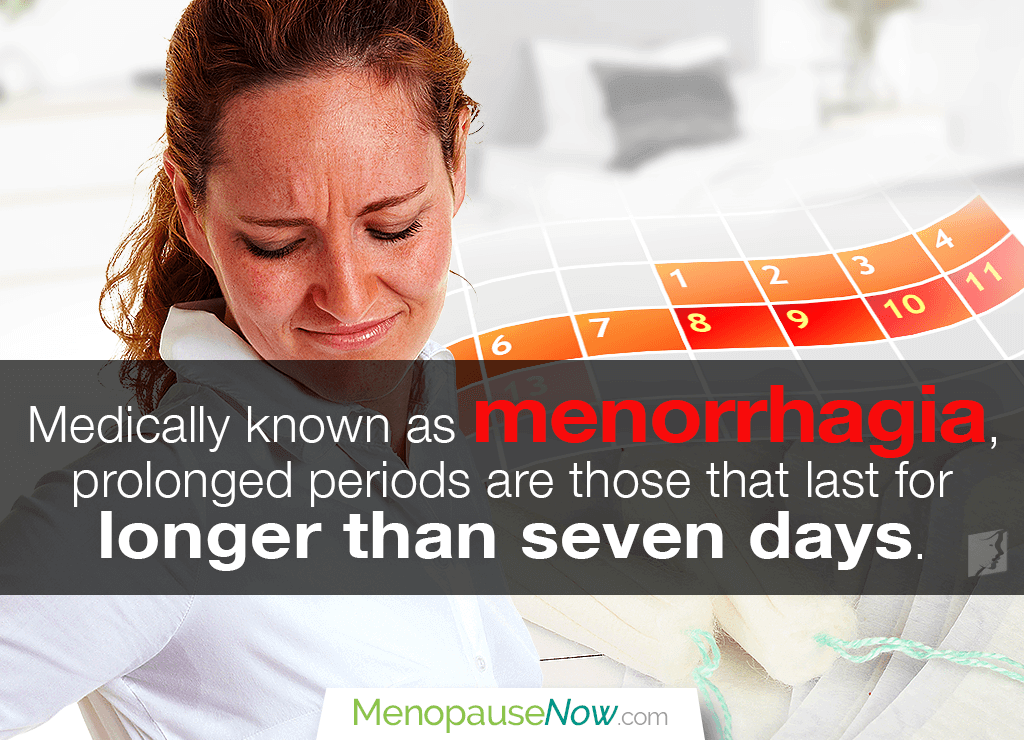While most periods last between three to seven days, some women suffer from excessively long menses that extend for longer than a week.1 Because having prolonged periods can have negative effects on women's health, it is key to seek adequate help right away.
Continue reading to find out more about prolonged periods, including causes and treatment options, to be on your way to optimal reproductive system health.
About Prolonged Periods
Prolonged periods, which are defined as those lasting for longer than seven days, are medically known as menorrhagia.2
Classified as an irregular period or a menstrual disorder, menorrhagia also refers to periods with an abnormally heavy flow, such as one exceeding 80 mL of blood per cycle.3
Causes of Prolonged Periods
Although some cases of prolonged periods are of unknown origins, one of the most common causes of irregular periods - before and throughout the menopausal transition - is hormonal imbalance.
Estrogen is responsible for thickening the uterine lining, while progesterone triggers its shedding. If their levels become unbalanced - for example, due to thyroid disorders, endometriosis, or polycystic ovary syndrome (PCOS) -, the equilibrium of other menstruation-essential hormones is thrown off, too. It can also cause an overdevelopment of the uterine lining, thus leading to heavy or prolonged periods.
Additionally, there are a number of other factors that may cause continuous or prolonged period bleeding or worsen the underlying imbalance, including:
- Uterine fibroids
- Uterine poyps
- Kidney disease
- Genetic disorders
- Pelvic inflammatory disease (PID)
- Medication side effects
If you are experiencing heavy periods, talk to a physician about finding appropriate treatment and preventing their complications on your health, including anemia.
Managing Prolonged Periods
Certain lifestyle adjustments may not correct hormonal imbalances, but they can provide a great deal of relief as they minimize disruption to daily activities and may better prepare you for a doctor's visit.
They include:
Maintaining an emergency sanitary stash. Putting a reserve of sanitary napkins and tampons in strategic places - like the office drawer, the car, and your purse - will make any emergencies much easier to deal with.
Keeping a menstrual journal. Write down any instances of intermenstrual bleeding and how much prolonged period bleeding you experience over the course of each month can help you see if a pattern develops.
Treating Prolonged Periods
Resolving irregular periods once and for all revolves around treating the underlying cause, which - in most cases - is hormonal imbalance, especially for menopausal women.
Lifestyle changes
Consider partaking in the following techniques that foster hormonal equilibrium in the body:
Exercise. Moderate exercise is essential to regulating hormone levels and lowering stress levels by releasing feel-good neurotransmitters. For those with weak joints, consider water aerobics, light cycling, or power walking. For more stationary routines, partake in strength training, which will also help promote healthy bone density and muscle mass.
Maintain proper nutrient consumption. Prolonged period bleeding can take a toll on your body as it struggles to replenish the lost iron and calcium. Those who do not replenish the lost iron may develop iron deficiency anemia, which further deregulates menstrual cycle patterns.
Alternative medicine
Many women find long-lasting relief when pairing lifestyle changes with the use of alternative medicine, including:
Phytoestrogenic herbal supplements - such as dong quai or chasteberry - contain plant estrogens that may help raise estrogen levels in the female body, thus compensating for what the ovaries are not producing.
Hormone regulating supplements, like Macafem, work with the body to nourish the endocrine and pituitary glands, thus promoting natural hormonal production. Because they do not introduce external hormones into the body, they are safer for long-term use.
In addition, other herbal remedies can help relieve associated menstrual cramping (like raspberry leaf) or fatigue (like ginseng) that comes with a prolonged menses.
Medications and surgery
Women with more severe cases of heavy, prolonged periods may consider pharmaceutical options.
Doctors will typically choose from medications to reduce blood loss, relieve pain, or balance hormones, such as oral contraception or hormone therapy. If medical therapy is unsuccessful, surgical treatment will be pursued on an individual basis.
More Information
Don't let prolonged periods keep you from staying healthy and positive. Armed with the information and suggestions above, you could soon be on your way to regular and healthy menstrual cycles. Click on the following link for more information about natural and effective irregular period treatments.
Sources
- CDC. (2017). Heavy Menstrual Bleeding. Retrieved February 3, 2020 from https://www.cdc.gov/ncbddd/blooddisorders/women/menorrhagia.html
- Mayo Clinic. (2017). Menorrhagia (heavy menstrual bleeding): Symptoms & causes | Diagnosis & treatment. Retrieved February 28, 2019, from https://www.mayoclinic.org/diseases-conditions/menorrhagia/symptoms-causes/syc-20352829 | https://www.mayoclinic.org/diseases-conditions/menorrhagia/diagnosis-treatment/drc-20352834
- The Society of Obstetricians and Gyneacologists of Canada. (n.d.). Normal Periods. Retrieved February 3, 2020 from https://www.yourperiod.ca/normal-periods/menstrual-cycle-basics
- Victoria State Government. (2017). Menstruation - abnormal bleeding. Retrieved February 28, 2019, from https://www.betterhealth.vic.gov.au/health/healthyliving/menstruation-abnormal-bleeding
Footnotes:
- Cleveland Clinic. (2019). Abnormal Menstruation (Periods). Retrieved February 3, 2020 from https://my.clevelandclinic.org/health/diseases/14633-abnormal-menstruation-periods
- InformedHealth.org. (2017). Heavy periods: Overview. Retrieved February 3, 2020 from https://www.ncbi.nlm.nih.gov/books/NBK279294/
- Clinical Evidence. (2012). Menorrhagia. Retrieved February 3, 2020 from https://www.ncbi.nlm.nih.gov/pmc/articles/PMC3285230/




